- Home
- Elizabeth Peters
Mystery Stories
Mystery Stories Read online
Mystery Stories
Elizabeth Peters
Contents
Liz Peters, PI
The Locked Tomb Mystery
The Runaway
About the Author
LIZ PETERS, PI
I did not have a hangover. Those rumors about me aren’t true; they are spread by people who are jealous of my ability to handle the hard stuff. The truth is, I can polish off three giant-sized Hershey bars before bedtime and wake clear-eyed as a baby.
All the same, I wasn’t at my best that morning. When I put my pants on, one leg at a time (I always do it that way), my heel caught in the hem, and then the zipper jammed and I broke a fingernail trying to free it. The weather was lousy—gray and bleak and dripping cold rain that didn’t have the guts to turn into snow. On Christmas Eve, yet. You’d think that the Big Gal Up There would have the decency to provide a white Christmas. I didn’t count on it. I don’t count on much.
My office was pretty depressing too. The velvety bloom on the flat surfaces wasn’t the winter light. It was dust. My cleaning woman hadn’t shown up that week.
I work out of my house because it’s more convenient; I mean, hauling a word processor and printer around with you gets to be a drag. I’m a mystery writer. It’s a dirty job, and nobody really has to do it. I do it because it’s preferable to jobs like embalming and mucking out stables. They say a writer’s life is a lonely one. That’s a crock of doo-doo. I’ve got enough of a rep so that people come to me. Too darned many of them, but then that’s the way it goes in my business. Too darned many people. You could say the same thing about the world in general, if you were philosophically inclined. Which I am.
You might ask why, if my profession is that of writer, I call myself a PI. (You might ask, but you might not get an answer. It’s nobody’s business what I call myself.) The truth is, I don’t know how I got myself into this private-investigating sideline. It sure as heck wasn’t for the money. Everybody knows PIs can’t make a living; look at their clothes, their scrungy living quarters, their beat-up cars. Some of the gals can’t even afford to buy a hat. So why did I do it? Simple. Because it was there—the dirt, the filth, the injustice, the pain. All of suffering humanity, bleeding and hurting and crying for help. When one of them bled on my rug, I had to do something. I mean, what the heck, that rug set me back a bundle. It’s an antique Bokhara. I should let people bleed all over it?
I have to admit it wasn’t a pretty sight that morning. Dust, dog hairs, cigarette ashes, and a few other disgusting objects (including the dogs themselves) dulled its deep-crimson sheen. After a cup of the brew, with all the trimmings—that’s how I drink it, and if people want to make something of it, let them—my eyeballs felt a little less like hard-boiled eggs. I lit a cigarette. What the heck, you only die once. My desk squatted there like an archaeological mound, layers-deep in the accumulated garbage of living. I had to step over a couple of bodies to get to it. There was another limp carcass on my chair. When I moved it, it bit me. So what was one more scar? I’m covered with them. That’s the way it goes in my business. Cats are only one of the hazards. The dogs are no picnic either. They don’t bite, but I keep falling over them.
I sat down on the chair and lit a cigarette. The blank screen of the word processor stared at me like the eye of a dead Cyclops. My stomach twisted like a hanged man spinning on the end of a rope. Shucks, I thought. Here we go again. I forced my fingers onto the keyboard. It was like that every morning. It never got easier, it never would. There are no words. That was the trouble—no words. At least not in what passes for my brain. But somehow I had to come up with a few thousand of them, spell them right, put them into the guts of the machine and hope they came out making sense. That’s my job. There are worse ones—performing autopsies and cleaning litter boxes, for example. But at 9 A.M. on a dreary winter morning on a mean street in Maryland, with dust and cat hairs clogging my sinuses and a couple of dogs scratching fleas, and my head as empty as Dan Quayle’s, I couldn’t think of one. I lit a cigarette.
The coffee cup was scummed with cold froth and the ashtray was a reeking heap of butts when I came out of my stupor to see that there were words on the screen in front of me. They seemed to be spelled right, too. I wondered, vaguely, what had interrupted the creative flow—and then I heard the footsteps. Heavy, halting steps, coming nearer and nearer, down the dim hallways of the house, inexorably approaching. … I looked at the dogs. They’re supposed to bark when somebody comes to the door. They never do. If I hadn’t heard them snoring I’d have thought they were dead.
Closer and closer came the footsteps. Slower and slower. He was deliberately prolonging the suspense, making me wait. I took one hand off the keyboard and pushed the shining waves of thick bronze hair away from my brow.
The lamp on the desk beside me cast a bright pool of light across the keyboard, but the rest of the room was dark with winter shadows. He was a darker shadow, bulky and silent. I lit a cigarette.
“Hey, Jaz,” I said. “Got time for some—”
He didn’t. He was a big man. When he hit the floor he raised a cloud of dust that fogged the lamplight and my sinuses. Got to call that cleaning woman, I mused between sneezes. She was Jaz’s cousin, or grandmother, or something. He’d found her for me. He was always doing things like that for me. He always had time for some …
I got to my feet and looked over the desk. He lay face down, unmoving. A film of gray covered his thick black hair. I know what death looks like. I’ve dealt with it … how many times? Forty, fifty times, maybe more. I can handle it. But I found myself thinking I was glad he’d fallen forward, so I couldn’t see his face—the strong white teeth bared, not in his friendly grin but in a final grimace of pain, the soft brown eyes fixed and staring and filmed with dog hairs … Call me sentimental, if you want, but dusty eyeballs still get to me.
As I stood there, fighting those softer feelings that hide deep inside all us mystery writers who moon-light as private investigators, despite our efforts to build a tough shell so we can deal with the sick, disgusting, hideous realities of life without losing our integrity or our nerve and go on with our jobs of removing an occasional small piece of filthy slime from the world so it’s a better place, if only infinitesimally so … Anyhow, after I had wiped my eyes on my sleeve, a little spark of light winked at me from the center of his broad back.
I had to push the dogs away before I could kneel beside him. They’re so doggone stupid. They couldn’t even tell he was dead. They were nudging him, wanting him to get up and play, as he always did.
It could have been a jeweled decoration or medal, if it had been on his chest instead of his back. The colorless stones glimmered palely in the dusky room. They weren’t diamonds or even rhinestones. They were glass. I should know. I had only paid ten bucks for the hatpin. I collect hatpins. Just one of my little weaknesses. The last time I’d seen this particular specimen … I couldn’t remember when it was. Had it been in the porcelain holder with the others, the last time I looked? Trouble was, I hadn’t really looked. You don’t look at familiar objects, things that have been in their places for weeks or months or years. You just assume they’re there, the way they always have been. I recognized it, though—the head of it, I mean—and I knew only too well what the rest of it was like. Ten inches of polished metal, rigid and deadly. In Victorian days they passed laws limiting the length of the pins women used to hold those enormous hats in place. Ironic, I thought, lighting another cigarette. Men turn purple with outrage when some legislator tries to keep them from stockpiling Uzis, but a woman couldn’t even own a lousy hatpin …
The mind plays funny tricks on you when a friend drops dead on your floor. I was wondering whether there were still laws on the books
banning hatpins when I heard something that woke me up like a dash of icy water in the face. Mine is the last house on a dead-end road, out in the country, so when I hear a car I know it’s heading for me. This one was coming too fast, tires screeching around the steep downhill curve. I got to the window in time to see it slow for the sharp turn into my driveway. Amazing. He’d had sense enough not to use the siren. He can never resist the flasher, though; it spun like a dying sun, sending red beams through the rain.
It was like a thick curtain had been yanked away, clearing my head; I saw it all, clear as a printed warrant. I’d been set up. But good. A dead man in my study, my hatpin through his heart, and the fuzz tipped off in time to catch me red-handed. (A figure of speech we PIs use; there wasn’t much blood, and I hadn’t been stupid enough to touch the body.) I was in deep doo-doo, though. That wasn’t generalized fuzz, it was my nemesis, Sheriff Bludger. We had tangled before, on issues like gun control, and he wasn’t awfully crazy about little me. A thickheaded rednecked male chauvinist, he would be drooling at the prospect of catching me with my hatpin in somebody’s back.
The cruiser swung into the driveway and accelerated, sending the gravel flying. One of the cats growled. I looked at him. “Hold ’em off, Diesel,” I snapped. He jumped off the windowsill and headed for the back door. The dogs were already there, stupid tails wagging. They could hardly wait to jump all over the nice cops and lick their hands and bring them balls to throw. The dogs were about as much use as fuzzy bunnies, but as I grabbed my purse I saw that Diesel had rallied the rest of the cats, six of them in all. They were all inside that day on account of the rain. Diesel himself weighs almost twenty pounds, and Bludger suffers from terminal ailurophobia. I figured I had maybe three minutes.
I went out the front door while Bludger and Company were trying to get in the back. Unfortunately the Caddy was also in the back. I circled carefully around the house, shivering as the cold rain stung my face, and crept through the shrubbery till I reached the garage. Peering around the corner, I saw the cruiser parked by the back steps. The back door was open, and from inside I could hear a lot of noise—dogs barking and men cursing. There was no sound from the cats. Unlike dogs and rattlesnakes, they don’t warn you before they strike. They aren’t gentlemen. That’s one of the reasons why I like them.
The Caddy purrs like a kitten and turns on a dime. I was out of the garage and heading down the drive before Bludger got wind of what was happening. Darned fool—if he’d left the cruiser blocking the gate I’d have been in big trouble, but no, he had to come right up to the door. That big beer belly of his makes him reluctant to walk farther than he has to, I guess. It was wobbling like a bowl of custard when he came barreling out of the back door, waving his stupid little gun and yelling. I waved back as I sent the Caddy shooting through the gate.
I pushed a lock of shining bronze hair out of my eyes and shoved my foot down hard on the gas. The car roared up the hill like a rocket, taking the curves like the sweet lady she is. You can have your Porsches and Ferraris; I always say there’s nothing like a Cadillac brougham for eluding the cops. Not that I was up for a high-speed chase across the county. Excessive speed is socially irresponsible, and besides, Bludger could cut me off at the pass; he knew the back roads as well as I did and he had plenty of manpower. I had to get out of sight, but fast—within the next thirty seconds—and I knew just how to do it.
I’m not given to praying, but I sent a passionate petition to the patron saint of private eyes as I thundered toward the stop sign at the top of the hill. She came through for me; the main road was clear. Instead of turning right or left, I hit the brake and sent the Caddy slithering across the road and up the bank on the opposite shoulder. A big green-and-white construction trailer stood there; the bridge across the creek had been finished three months earlier, but they hadn’t got around to removing the trailer. Typical. And lucky for me. I barely made it, though. A couple of inches of my back fender were still visible when the cruiser appeared, but Bludger didn’t notice. He was too busy trying to figure out which way I had turned. The decision was easy, even for his limited brain; a right turn would have taken me onto the bridge and a mile-long stretch of straight road. To the left the road rises and curves. He went left.
I waited till he was out of sight. Fastening my seat belt, which I hadn’t had time to do before, I backed out of my hiding place and headed across the bridge. I have to admit my pulse was pretty fast; this was the tricky part, if Bludger got smart and turned back too soon, he’d see me. I couldn’t stay where I was for the same reason, the Caddy would have been visible to a car coming down the hill.
Saint Kinsey was still with me. Across the bridge and over the hill, to Grandmother’s house we go … The driveway was a rutted track, with only a few grains of gravel remaining, the house looked like an abandoned ruin. She came out on the sagging porch, her shotgun over her arm, squinting through the rain. When she recognized me, a toothless grin split the wrinkled face under the faded sunbonnet.
“Hey, Liz. Got time for—”
“No, Grannie.” I slung my purse over my shoulder. “I need to borrow the pickup. If Bludger finds the Caddy, tell him I stole your truck, okay?”
Grannie spat neatly into the weeds beside the steps. “Keys are in the ignition. Leave yours; I’ll pull the Caddy into the shed after you go.”
Movement at the window caught my eye. Something fluttered against the pane, like a trapped moth. A hand—too small and thin, too pale … I swallowed hard and waved back. “How’s Danny doing?”
“Okay. That wheelchair you got him was a big help. Don’t s’pose you’ve got time to come in and say hello? He don’t see many folks, and he’s crazy about you …”
“That’s ’cause he don’t see many folks.” I forced a smile, directed it at the window, where Danny’s small pale face was pressed to the glass. The wheelchair might have been a help, but it was a heck of a Christmas present for a kid. I’d tied a big red bow across the seat and then ripped it off—too much of a contrast between holiday cheer and sad reality—one of those ironic contrasts we PIs keep seeing all around us …
I swallowed harder, stuck my cold hands in the pockets of my jeans. My fingers touched something soft. I pulled it out. It was a little squashed, but Danny and I had agreed we liked chocolate that way. “Give him this, Grannie. As a token of better things to come. Tell him—tell him I’ll be back to spend Christmas Eve with him.”
Grannie’s rheumy eyes opened as wide as her wrinkled lids allowed—not much. “But, Liz, it’s your spare. What’ll you do without—”
“I’ll manage,” I said gruffly. “No big deal. See you later, Grannie—unless I’m in the slammer.”
She offered me the shotgun, the sunbonnet, and the dirt-colored sweater she had thrown over her shoulders. I took the last two, winked at her, and headed for the truck.
Heading south on 75 I met two cruisers heading north. I smiled without humor. The county crooks would have a field day today, beating up their wives and dealing drugs and driving drunk unmolested; Bludger would have every available cop out looking for harmless little old me.
I’d had my eye on Bludger for months. I couldn’t believe he was as stupid as he looked; but if he wasn’t up to his thick neck in the drug traffic, why did he keep getting in my face very time I tried to nail a local dealer? Over the past years, drug traffic in the county had increased a hundredfold. It wasn’t just kids and adult delinquents growing marijuana in woodland clearings, it was crack and coke brought in by big-city dealers who found lucrative markets and safer operations out in the boonies. Every now and then Bludger would round up some kids from the Projects, and there’d be a big hurrah in the local paper. But I knew, and Bludger should have known, that that wasn’t going to solve the problem. The people who lived in the Projects weren’t supporting a million-dollar industry. The buyers had to be people with money, and they weren’t buying off the streets.
I had a personal interest in the drug biz. It
lost me a darned good cleaning woman—Danny’s mom. She was sixteen when she had Danny, after a hasty marriage to a scuzzball who beat her up with monotonous regularity before he got bored with the entertainment and walked out on her. Three kids (two of them died, don’t ask how), no education, no skills—it’s a wonder she stuck it out as long as she did. It was after the second baby died that she started doing drugs. Eventually, inevitably, they killed her. So now Grannie was trying to raise a seven-year-old on nothing a month and I was stuck with a lazy incompetent for a cleaning woman. You understand, it was the inconvenience that ticked me off. Not sentimentality. We tough female writer-PIs aren’t sentimental.
Grannie’s pickup made a noise like a tractor. I encouraged it onto the freeway ramp and headed east toward Baltimore. A couple of miles and I’d be over the county line. Not that that would do me much good; Bludger would certainly have alerted the state cops as well as his counterparts next door. I drove at about forty, not because I was trying to avoid traffic cops but because that was as fast as the pickup would go.
There had to be some connection between Jaz’s murder and my recent investigations. Could it be Bludger himself who had set me up? I’d talked to Jaz about my suspicions, after he told me about a friend of his who’d been arrested for dealing dope down in D.C. (These days it’s hard to find someone who doesn’t know someone who’s been arrested for dealing dope down in D.C.) Would Bludger commit murder just to get me off the trail? Not unless I was sniffing right at his heels. If I was, I sure as heck didn’t know it.
The sleety rain was falling harder and the windshield wipers seemed to be suffering from mechanical arthritis. I decided I’d better get off the road. Pulling into a McDonald’s, I ordered coffee and a Big Mac with everything (what the heck, you can only die once) and parked.
I always get my best ideas when I’m eating. Don’t know why that is. Maybe cholesterol stimulates the brain cells. After finishing my Big Mac I lit a cigarette and drove on to the shopping center. It was all decorated for Christmas—had been since mid-October—and it was the most depressing darned sight I had ever seen. The plastic wreaths and garlands had faded to a sickly chartreuse; they hung like dead parrots from lampposts and storefronts. Rain dripped drearily off the shiny red plastic bows. Strategically spotted speakers blared out that lovely classic carol, “I Saw Mommy Kissing Santa Claus.” Next on the agenda, no doubt, would be “All I Want for Christmas Is My Two Front Teeth,” or “I Don’t Care Who You Are, Fatty, Get Those Reindeer off My Roof.” I swallowed the tide of sickness rising in my throat and reminded myself to replenish my supply of Di-Gel. We PIs buy a lot of antacids. Especially around Christmas.

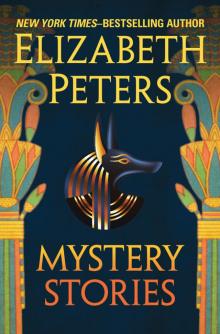 Mystery Stories
Mystery Stories A River in the Sky
A River in the Sky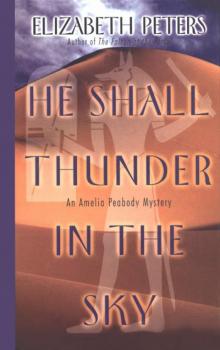 He Shall Thunder in the Sky taps-12
He Shall Thunder in the Sky taps-12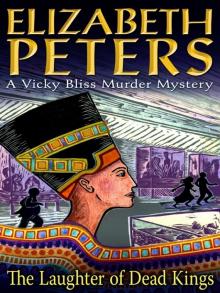 Laughter of Dead Kings vbm-6
Laughter of Dead Kings vbm-6 Silhouette in Scarlet vbm-3
Silhouette in Scarlet vbm-3 Night Train to Memphis vbm-5
Night Train to Memphis vbm-5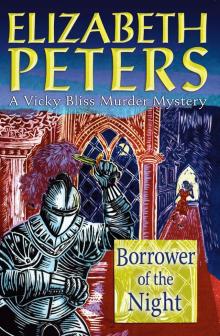 Borrower of the Night vbm-1
Borrower of the Night vbm-1 The Golden One
The Golden One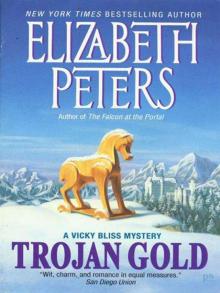 Trojan Gold vbm-4
Trojan Gold vbm-4 Crocodile On The Sandbank
Crocodile On The Sandbank